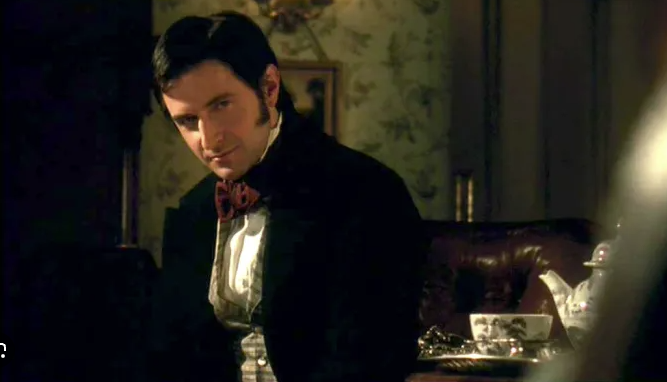Have you ever imagined a different ending to North and South—one where Margaret remains single the rest of her life? Would she find happiness and fulfillment without marrying John Thornton?
I occasionally run into North and South fans who wish the ending of Gaskell’s story wasn’t so traditional. Something in them cringes to watch the independently-minded Margaret Hale sign up for married life. And it bothers them that according to Victorian laws, Margaret would be turning over her entire fortune to John the instant they marry. These particular fans feel sad that Margaret would be giving up her independence.
I can understand their wish to see Margaret continue to be a strong model of womanhood. She acts like an equal to the men in her life, and shows no signs of depending on a husband to establish her identity. She follows her own individual convictions of what’s right or important. And it’s exciting to see a woman like that come into a large inheritance. Margaret’s wealth gave her more freedom to choose her own path.
So what was is it she wanted to do with all her money? Was she having a grand old time being rich in London? She wasn’t having a fantastic time spending her money on herself, or on making the social rounds. She is bored out of her mind living in a house full of people who only think of how to entertain themselves next. She certainly wasn’t interested in marrying just because that’s what you were supposed to do.
What did she want, after all? Did she want to be alone?
The Margaret Hale in the last few chapters of the book is very melancholy. She spends a great deal of time trying to get over losing her relationship to John. She resolves to make the best of her life, despite her deep longing for “what could have been.”
Does Margaret want to have a family? Yes. Gaskell draws this desire out by showing how much Margaret loved it when Edith’s little boy fell asleep in her arms:
Those were Margaret’s sweetest moments. They gave her a taste of the feeling that she believed would be denied her forever.
But she’s not going to marry just anyone to have a family. She has made a commitment with herself to “speak and act the truth for evermore.” She’s already in love with Thornton. There’s no way she will compromise herself by marrying someone she doesn’t love. This is why Margaret tells Edith she will never marry. Margaret firmly believes she has lost her one chance at happiness.
I’m not buying the idea that Margaret would have been happier on her own than with John in Milton. I’m not able to imagine her living her best life all alone in London with no one to really understand her. Not a single person in her social circle comprehends her.
Margaret wanted to make a difference for others. She wanted to be involved in her community. She wanted to have a purpose beyond herself. She longs to love and help others. When she resolves to do as she pleases at Harley Street, she chooses to do charity work to fill her time and give her some purpose.
If she had lived her life alone, she would have continued to find ways to help people who needed help in London. This, she felt, was being true to herself. She would be satisfied in some sense, but I doubt she would ever be completely rid of the lingering sadness for the life she might have had.
I trust Margaret’s instincts for her own happiness. As a women wholly free to chose NOT to get married and to spend her wealth as she pleased, she chose to throw all her money into John Thornton’s hands. She offered him every pound she had in her account when she got the chance. She wasn’t interested in offering a token investment in his mill, she put her whole heart in her offer to help him revive the mill.
She trusted him with all her money, and wanted to join forces with him. And when he revealed his heart to her by calling out her name in earnest, she laid her head on his shoulders — she was tired of being alone. The relief and joy she and John both felt suddenly discovering that they would neither of them be condemned to a life alone is beautifully expressed in the holy silence described in those first few moments of physical contact:
…she turned her face, still covered with her small white hands, towards him, and laid it on his shoulder, hiding it even there; and it was too delicious to feel her soft cheek against his, for him to wish to see either deep blushes or loving eyes. He clasped her close. But they both kept silence.
It’s going to be a challenging life in Milton, but it’s the life she chooses, and she’s equipped for it. And she won’t have to spend the rest of her life kicking herself for turning down John Thornton!
The look of a woman who sees what she wants.




